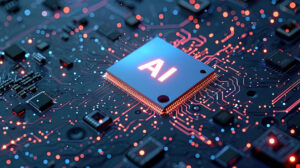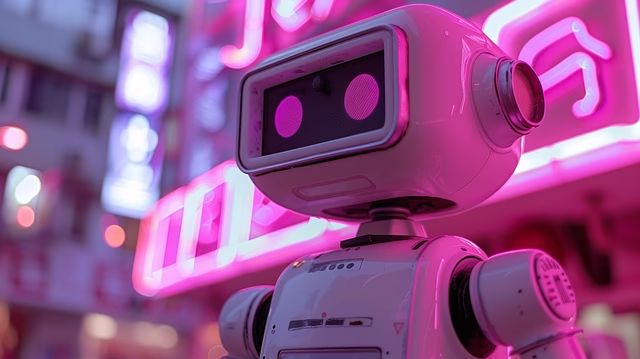In today’s rapidly evolving technological landscape, the term “artificial intelligence” (AI) has become a buzzword that spreads throughout our daily conversations. From the virtual assistants on our smartphones to the recommendations we receive on streaming platforms,
AI has seamlessly integrated itself into our everyday lives, often without us even realizing it. As we delve deeper into the world of AI, we uncover a realm of possibilities that have the potential to revolutionize the way we live, work, and interact with the world around us.
AI in Our Daily Routines
Have you ever wondered how your smart speaker knows the weather forecast or how your favorite music streaming service curates personalized playlists based on your listening habits? The answer lies in the intricate algorithms and machine learning models that power these AI-driven systems.

These intelligent assistants have become an integral part of our daily routines, simplifying tasks and providing us with valuable information and recommendations tailored to our preferences. One of the most notable examples of AI in our daily lives is the virtual assistant found on our smartphones.
These intelligent companions can perform a wide range of tasks, from setting reminders and alarms to answering queries and even controlling smart home devices. Their ability to understand natural language and respond accordingly has revolutionized the way we interact with technology, making it more intuitive and user-friendly.
AI in Healthcare: A Lifesaving Revolution
The potential of AI in the healthcare industry is nothing short of remarkable. From disease diagnosis and drug discovery to personalized treatment plans and robotic surgery, AI is reshaping the way we approach medical care.
Imagine a future where AI-powered diagnostic tools can analyze medical images and patient data with an accuracy that surpasses human capabilities. These intelligent systems can rapidly detect patterns and anomalies, enabling early detection and intervention for various diseases, including cancer and neurological disorders.
Furthermore, AI algorithms can assist researchers in accelerating the drug discovery process by analyzing vast amounts of data and identifying promising compounds more efficiently. This could lead to faster development of life-saving medications and treatments for previously incurable diseases.
AI in Transportation: Safer and More Efficient Journeys
The integration of AI into the transportation sector holds the promise of safer and more efficient travel experiences. Self-driving vehicles, once a concept confined to science fiction, are now a reality thanks to advancements in AI and machine learning.
A good example is Tesla Electric Vehicle models, which is creating shock waves in the industry since Elon Musk first in produced them. LEARN MORE
These autonomatic vehicles are equipped with great sensors and algorithms that enable them to navigate through complex environments, detect obstacles, and make real-time decisions to ensure the safety of passengers and other road users.

By removing the potential for human error, self-driving cars have the potential to significantly reduce the number of accidents and fatalities on our roads.
Moreover, AI-powered traffic management systems can analyze real-time data from various sources, such as traffic cameras and sensors, to optimize traffic flow and reduce congestion. This not only saves time for commuters but also contributes to reducing emissions and improving air quality in urban areas.
AI and Personalized Experiences
One of the most significant impacts of AI on our everyday lives is the personalization of our experiences. From the content we consume on streaming platforms to the products we see advertised online, AI algorithms analyze our preferences, behaviors, and browsing patterns to tailor the content and recommendations we receive.
Personalization algorithms can learn our taste in movies, music, and books, providing us with tailored recommendations that cater to our unique interests. A practical example in multiple social media platform such as TikTok and Youtube on the For You page. This not only enhances our entertainment experiences but also saves us time and effort in sifting through countless options.

Similarly, in the realm of e-commerce, AI-powered recommendation engines can suggest products based on our browsing history, previous purchases, and preferences, making it easier for us to discover items we might be interested in.
Ethical Considerations and Responsible AI Development
As AI becomes increasingly integrated into our daily lives, it is crucial to address the ethical considerations and potential risks associated with this technology. Issues such as data privacy, algorithmic bias, and the impact on employment are at the forefront of discussions surrounding AI development.
Ensuring data privacy and safeguarding personal information from misuse or unauthorized access is of utmost importance. Strict regulations and guidelines must be implemented to protect individuals’ privacy rights while enabling the responsible development and deployment of AI systems.
Additionally, addressing algorithmic bias is crucial to prevent discriminatory outcomes and ensure fair and equitable treatment for all individuals, regardless of their race, gender, or other protected characteristics. This requires diverse and inclusive teams working on AI development, as well as rigorous testing and auditing of algorithms to identify and mitigate potential biases.
Furthermore, as AI automates certain tasks and displaces human workers in some industries, it is essential to provide support, retraining, and new opportunities for those affected. This could involve investment in education and skills development programs to prepare the workforce for the jobs of the future.
Embracing the AI Revolution
As we navigate the rapidly evolving landscape of AI, it is essential to embrace this technology while also addressing its challenges and risks. By fostering responsible and ethical AI development, we can harness its potential to improve our lives in countless ways, from enhancing healthcare and transportation to providing personalized experiences and beyond.
The integration of AI into our everyday lives is not merely a possibility. It is an ongoing reality that is shaping the world around us. By staying informed and engaged in the discussions surrounding AI. We can actively participate in shaping its future and ensure that it serves the best interests of humanity.
In conclusion, AI is no longer a far-fetched concept reserved for science fiction movies; it is an integral part of our lives, transforming the way we live, work, and interact with the world around us.
References:
1. Kaplan, A., & Haenlein, M. (2019). Siri, Siri, in my hand: Who’s the fairest in the land? On the interpretations, illustrations, and implications of artificial intelligence. Business Horizons,
2. Topol, E. J. (2019). High-performance medicine: the convergence of human and artificial intelligence. Nature Medicine,
3. Makridis, C., & Rouwenhorst, K. G. (2021). Artificial intelligence, automation, and employment: Forecasting the labor market disruption. Journal of Economic Dynamics and Control,
4. Angwin, J., Larson, J., Mattu, S., & Kirchner, L. (2016). Machine bias: There’s software used across the country to predict future criminals. And it’s biased against blacks. ProPublica,
5. Dignum, V. (2018). Ethics in artificial intelligence: introduction to the special issue. Ethics and Information Technology,
6. Topol, E. J. (2022). The future of artificial intelligence in medicine. Npj Digital Medicine,
7. Aziz, A., & Dowling, M. (2021). Machine learning and software engineering in self-driving cars.
8. Mehrolia, S., Alagheband, P., & Gourisetti, S. N. G. (2020). Advancements in artificial intelligence and its applications in healthcare: A review. Journal of Biomedical Engineering and Biosciences,
9. Xu, J., Yang, P., Xue, S., Sharma, B., Sánchez-Medina, J. J., Rodríguez, I., & Qin, Y. (2021). Recommender systems for online healthcare education. Journal of Medical Internet Research,
10. Martínez-Plumed, F., Contreras, J., Hager, G. D., Hernandez-Orallo, J., & Flach, P. A. (2021). Ethics and societal impact of artificial intelligence: Critical issues and challenges. Frontiers in Artificial Intelligence,
11. Artificial Intelligence – Wikipedia

